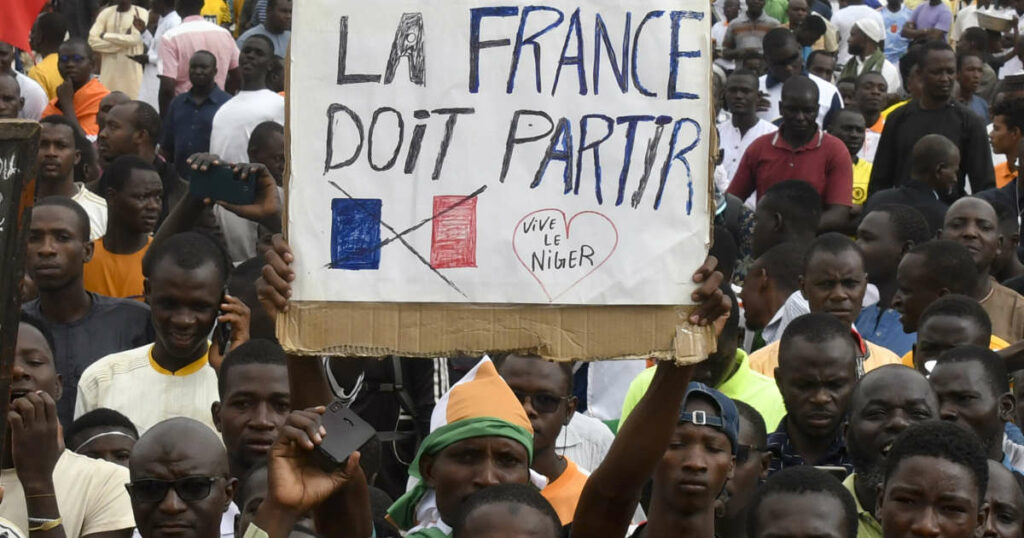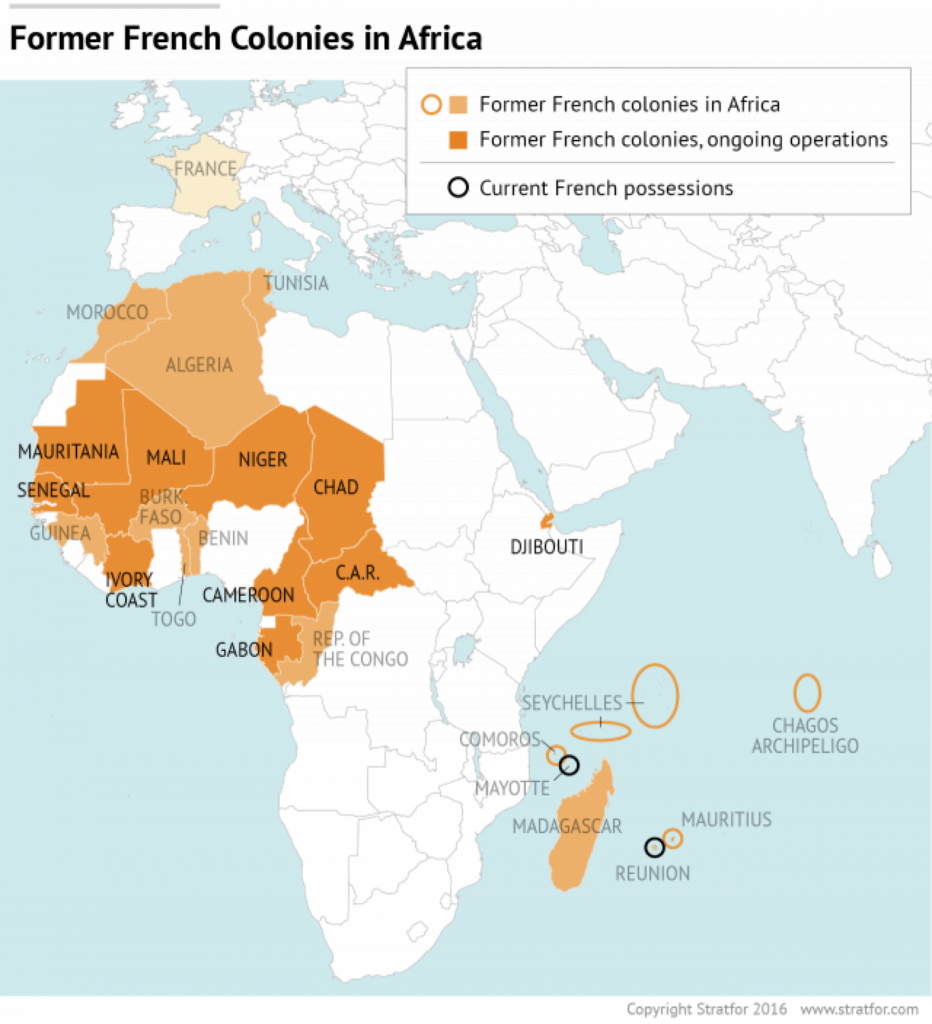
- Despite the liberation, France continues to hold the national reserves of fourteen African nations.
- France asked for a monopoly on products and services, thereby guaranteeing that African assets ended up in French hands.
- Since 1960, France has interfered in African nations over fifty times to defend its self-interest.
The Shadow of Neo-Colonialism: Continued French control over former colonies
In 2024, Africa is still feeling the aftermath of French colonialism. Intense protests against neo-colonialism have erupted. The fires of discontent glow intensely as African youths, frustrated and suppressed, march in the streets. This is evident in their shouts of pure anger, where they assert that their nations are still colonized by France. Even though African nations were given a veil of independence more than five decades ago, they are still bound by complex chains of economic and political slavery, which is a clear example of continuous exploitation and domination over the former colonies.
Birth of the Neo-Colonial Empire
Neo-colonialism began in the post-Second World War period when colonialism was on the decline. Similar to other nations across the globe, Africa was not left out when independence struggles against European colonization were on the rise. France was significantly affected and economically on the brink of collapse due to the impacts of the World War, reluctantly agreed to their independence but found a smart way of continuing to dominate the former African colonies and make money from them.
Under the leadership of President Charles de Gaulle, France implemented a deceptive policy, particularly the so-called ‘decentralization of power,’ where nominal independence coexisted with economic dependence. Various African nations were required to sign “cooperation agreements” obligating them to follow French policies. The contracts signed during the colonial period ensured that African countries would depend on France for economic growth, commerce, and monetary reform. This was created by the CFA franc, which is pegged to the French franc and more recently to the euro, tethering Africa’s economies.

The Economic Constraints and Resource Exploitation
Originally designed for currency, the CFA franc was transformed into a control mechanism. This implied that through the requirement of depositing 70% of their foreign exchange reserves in the French treasury, France crippled these nations economically. Regardless of this policy, most African countries had little or no import capability and therefore experienced slow economic growth. Even slight compromises in 2005 hinted at this stronghold, with these nations having only 30% of their forex reserves available to them.
Despite the liberation, France continues to hold the national reserves of fourteen African nations. They are Benin, Burkina Faso, Guinea-Bissau, Ivory Coast, Mali, Niger, Senegal, Togo, Cameroon, the Central African Republic, Chad, Congo-Brazzaville, Equatorial Guinea, and Gabon. These reserves have been in the custody of France since 1961. These zones, which are still present today as the CFA, represent 12 of the former colonies.
This financial control was accompanied by unrelenting trade exploitation. France asked for a monopoly on products and services, thereby guaranteeing that African assets ended up in French hands. The Africans who produced cocoa in Ivory Coast and uranium in Niger saw their resources taken away to enrich France’s economy while they remained poor. Elf, the French state-owned company, dominated the supply of oil and uranium in Gabon, which helped to maintain French nuclear power and energy.
Politics and Military Interference
It was not all about economics; however, France also had a hold over them politically. Both domestically and internationally, France aimed at placing loyal leaders in African nations. Jacques Foccart, a French diplomat who was involved in shaping post-colonial politics in Africa, was responsible for covert operations that ensured the loyalty of the African elite. These leaders, who spoke French and were assimilated into French High Society, made sure that their countries remained colonized by the French.
In cases of political instability, France used force and employed military intervention. Since 1960, France has interfered in African nations over fifty times to defend its self-interest. This was evident in Gabon, which, despite having large deposits of oil and uranium, continued to be backed militarily by France even when its rulers were dictators. The present holder of power, Ali Bongo, is still receiving protection from France, thus maintaining the status quo.
Modern Face of Exploitation
Today, the negative consequences of French colonization are still present. The use of the CFA franc remains a negative force on African economies by suppressing their growth and development. For instance, Senegal faces the same problem in terms of competition as long as the value of the CFA franc is pegged to the euro, making local products costly and uncompetitive. This economic straitjacket has led many countries to experience shrinking GDPs and high poverty rates.
Corruption has become deep-rooted within African elites, supported by French multinationals who transfer billions to overseas banks. The leaders of these countries, such as Omar Bongo, have accumulated their wealth at the expense of their nations. This neo-colonial exploitation clearly indicates that French imperialism is still very much alive, albeit in a covert manner under the guise of partnership.
Resistance and Hope
However, resistance is mounting. Young Africans, frustrated with years of abuse, are standing up to this new imperialism. Protests, such as those seen in Senegal, are getting louder and more frequent. In 2017, protests against the CFA franc across the African continent showed that there is resentment and demand for real independence. Everyone is involved in the protest, including musicians, activists, and the general public.
France, aware of these changes, has provided recommendations. President Macron outlined that France will introduce a new currency known as the ECO, with its release planned for 2027. While this holds some hope, the majority of experts are sceptical, regarding it as more of an optical change than a structural shift. They claim that actual authority will continue to belong to France.
Some territories in 2024 are still colonized by France, showing that parts of it still practice imperialism. These include French Guiana, Guadeloupe, Martinique, Mayotte, Réunion, Saint Barthélemy, Saint Martin, Saint Pierre and Miquelon, Wallis and Futuna, New Caledonia, French Polynesia, and Clipperton Island.
Conclusion
The narrative of French neo-colonialism in Africa is one of domination, defiance, and the search for liberation. Today, regional people look at Africa as it struggles to overcome the colonial masters’ legacy and build a future free from foreign interference. The fire of protest still rages among the youth who should not be bound by the chains of colonialism. The fight goes on, but the spirit of the people remains unbroken. The struggle for real independence in Africa is ongoing, and African people are increasingly eager to take their fate into their own hands.
References:
- https://www.brookings.edu/articles/how-the-france-backed-african-cfa-franc-works-as-an-enabler-and-barrier-to-development/
- https://hir.harvard.edu/true-sovereignty-the-cfa-franc-and-french-influence-in-west-and-central-africa/
- https://peace-int.org/en/2021/07/07/francafrique-2/#
- Video: https://youtu.be/36vYRkVYeVw?si=fNqGPSSS-BJoM7u6
- Video: https://youtu.be/M9wTHcZfwsw?si=YW1bSuaNR7l-PB-F
